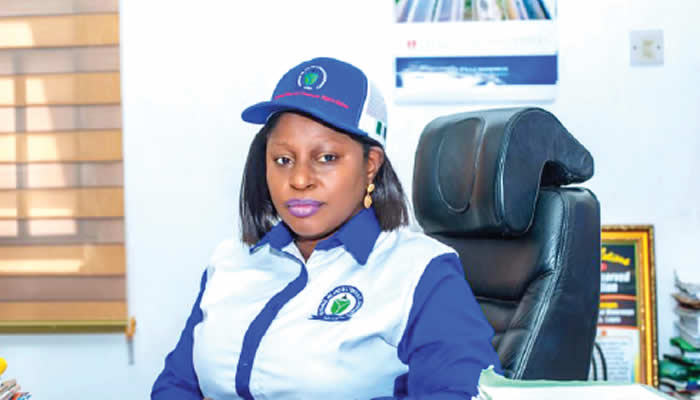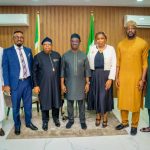
Sarat Braimah is the Lagos Area Manager of the National Inland Waterways Authority. In this interview with ANOZIE EGOLE, she speaks on the plans of the agency to reduce boat accidents on the waterways
Before now, there had been arrests of captains violating navigational rules. What is the update on those arrested?
We have made some arrests. We have made about three arrests since 2021. The first arrest was the person carrying children without life jackets. The captain was arrested, charged to court and was jailed for three months. The other one was the case where one life was lost. The captain is still in court now and the case is still ongoing. The judge has not yet confirmed what the penalty will be, but he is in court now.
We are in a rainy season and one significant thing about this season is that the tides are always very high. Is there anything the agency is doing to sensitise waterways users on this?
We are aware that the yuletide season is close by and people make use of the waterways more. So, we have increased our sensitisation. We are doing safety awareness campaigns; we finished one about three weeks ago. We are starting another one by October and another one in early December at every jetty in Lagos State.
There is a new boat operators association, Waterfront Boat Owners and Transporters Association of Nigeria. Do you think the coming on board of this association will address some of the challenges the operators are facing?
For us at NIWA, it is a good one because when you can identify who to hold responsible for things happening in your jurisdiction, it is a plus. So, at least they are given a face to their names. It is not the era where we would say that the captain did not belong to any group. We didn’t even know what to do. But now, when they form an association, it makes it easier for us to coordinate them, especially with the training we are having now. You know there is an ongoing training for all boat skippers and they come in groups. So, it will be easier for us to go through these associations. It is a good thing that it is coming especially at this time that the training is going on. I told them that what we don’t want is what is happening on the roads, where people are forced to pay unnecessary levies.
Do you have a strategy to ensure that operators are not molested in the guise of collecting levies?
Unionism is not by force. The association has its own act that is guiding the members and they have submitted that here. So, we know where and where they can go. But we do not want going on the water to harass people because it can actually cause boat mishaps. We have tax force going around the waterways to monitor what is happening. So, if this happens, they will arrest them.
Barge operators recently asked that 20 per cent transportation budget be channelled to water transportation, saying it will go a long way to boost the sector. Do you think that can address some of their challenges?
At least, it will help, even though it is not going to be enough. It is still very fine because we need to dredge our routes. A lot of wrecks will be removed and these are capital-intensive projects. We need dredging; we need a lot of jetties like an inland port to assist all these barging operations. So, it is needed and if 20 per cent is diverted to inland waters, we will see changes.
Between NIWA and LASWA, who is actually responsible for levying boat operators?
We have what we call “boat operators licensing” and it is issued by NIWA if they are plying the inland waters. The Nigerian Maritime Administration and Safety Agency has its own safety rules on the coastal water. You can read the judgment of thee court, it was well spelt-out.
The Nigerian Ports Authority recently said it wanted to concession barging. Do you think this is a step in the right direction?
Even now, barging operation is not being done by any government agency. NPA, NIWA, NIMASA amongst others do not have barges. It is individuals that have barges. So, if they say they want to concession, it is the same thing, just that they want to make it a bigger business. Maybe they want to use a bigger company that has a face to do it, but there is no government agency that is into barging now.
On the issue of ensuring greener shipping and facing out two-stroke engine, are there plans by NIWA to support these operators acquire newer boats, knowing that is it capital-intensive?
The theme of this year’s World Maritime Day is, “New technology for greener shipping.” That is using new technology for greener shipping. Now, we want to transfer that to inland waterways. That was why I told them the two-stroke engine releases a lot of carbon that kills most aquatic animals. So, we want them to change to new technology for the good of everyone. They can access the Cabotage Vessels Financing Fund to be able to get newer boats. We also have the Bank of Industry, and the government is actually helping.
Who controls dredging activities?
Dredging activities are controlled by NIWA. When I assumed office newly, we engaged them to ensure they were doing the right thing. There are regulations, and we have regulations on dredging in Lagos State in terms of the type of dredger they can use, where they can dredge, how many meters away from the shore they can dredge, and the type of license they can take. Those are all the regulations for dredging in the inland waterways. And I can tell you that they are complying. In terms of compliance, it is like 70 per cent, though we still have some people that do not comply. Our task force is there all over. And we have our staff members that are grouped into six different axes such as Badagry, Ikorodu, Aja-Lekki, Ojo, amongst others. They monitor these axes to ensure there is no problem, even for navigations. So our staff members are there to ensure that when they dredge, our navigation will not be disturbed.
What strategy is the agency adopting to address the numerous boat mishaps, especially on Lagos waterways?
Many things can be done, and are being done to address boat mishaps such as training of boat drivers and licensing of same to properly equip them to drive professionally. NIWA is already doing that, particularly in the southern parts of Nigeria. We are about commencing same in the northern part. We also hold regular safety awareness and sensitisation campaigns across parts of the country. We carry out regular security and compliance patrols on the waterways. NIWA has established nine search and rescue stations, and will establish three more this year across various locations in Lagos, Lokoja, Port Harcourt, Yauri, New Bussa, amongst others. These stations are intended to prevent, but also respond immediately and provide timely rescue. The Authority also ensures that inland river crafts are inspected for standards and safety compliance in terms of seaworthiness before such boats are registered and authorised to operate as passenger boats or even for private use.
For me, Safety is everybody’s business, but every group has a distinct role to play, though the regulating bodies are permitted to lead. Then, we start with professionally defining the persistent problem that bedevilled our waterways. Thus, we are able to identify the unsafe condition, unsafe act, and the combination of both, anchored on practical experiences. Then, we came up with a set of workable strategies, anchored on the prevailing kinds and nature of boat accidents. We can win the war against the menace.
Are there other means you think some of these challenges can be holistically tackled?
It’s the right time to not only re-plan our inland waterway transportation, holistically, but to correctly understand overloading and boat fits for purpose. There is a need for standardised boats to operate and to gradually phase out boats built on certain materials like woods, vegetation along the river banks, and provide access to training /retraining of boat operators. Compulsory provision of manifest systems and light houses is important. There is a need to prepare for boating activities in terms of market days, especially markets located along our waterfronts, to take care of peak movement of passengers. It is important to instutionalise the clearing of all obstructions dotting our waterways, especially the semi-submersibles. Discussions are on to provide surveillance gadgets along the waterways to enhance safety and security. Our personnel are also deployed to the respective loading terminals to provide pre- boarding safety talk to passengers and prevent overloading and night sailing.
Are there any plans towards regulating the people that manufacture these boats?
The Authority recognises that some of the boat accidents are caused by the use of sub-standard boats. To stem from this scourge, efforts have reached advanced stages to formulate standards and regulate the boat building industry. In the long term, subsequently, some classes of boats will be phased out.
The causes of boat accidents in the North are a little different. They are caused majorly by excessive overloading and use of old wooden boats. The presence of tree stumps and snags; flagrant disregard for safety regulations and night sailing are some of the peculiar causes. They are also not trained for boat driving. We have perfected plans for the training of boat drivers in some locations in the North. We also realised that non-availability of enough passenger boats may be responsible for the overloading. We have, therefore, intervened to provide some passenger boats and will soon award a contract for the construction of a “mass transit” passenger boat to be deployed in the North.














